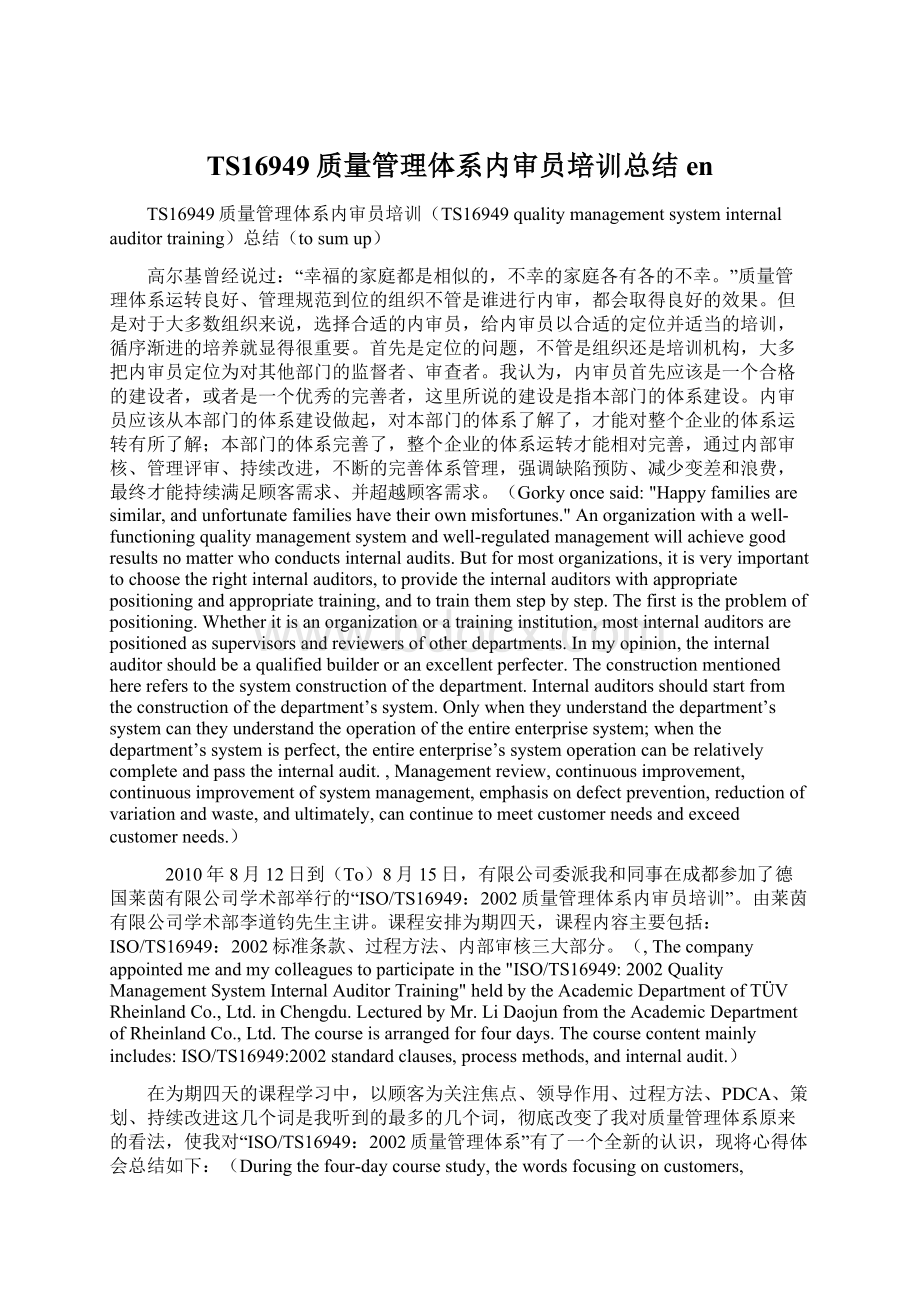TS16949质量管理体系内审员培训总结en.docx
《TS16949质量管理体系内审员培训总结en.docx》由会员分享,可在线阅读,更多相关《TS16949质量管理体系内审员培训总结en.docx(9页珍藏版)》请在冰豆网上搜索。

TS16949质量管理体系内审员培训总结en
TS16949质量管理体系内审员培训(TS16949qualitymanagementsysteminternalauditortraining)总结(tosumup)
高尔基曾经说过:
“幸福的家庭都是相似的,不幸的家庭各有各的不幸。
”质量管理体系运转良好、管理规范到位的组织不管是谁进行内审,都会取得良好的效果。
但是对于大多数组织来说,选择合适的内审员,给内审员以合适的定位并适当的培训,循序渐进的培养就显得很重要。
首先是定位的问题,不管是组织还是培训机构,大多把内审员定位为对其他部门的监督者、审查者。
我认为,内审员首先应该是一个合格的建设者,或者是一个优秀的完善者,这里所说的建设是指本部门的体系建设。
内审员应该从本部门的体系建设做起,对本部门的体系了解了,才能对整个企业的体系运转有所了解;本部门的体系完善了,整个企业的体系运转才能相对完善,通过内部审核、管理评审、持续改进,不断的完善体系管理,强调缺陷预防、减少变差和浪费,最终才能持续满足顾客需求、并超越顾客需求。
(Gorkyoncesaid:
"Happyfamiliesaresimilar,andunfortunatefamilieshavetheirownmisfortunes."Anorganizationwithawell-functioningqualitymanagementsystemandwell-regulatedmanagementwillachievegoodresultsnomatterwhoconductsinternalaudits.Butformostorganizations,itisveryimportanttochoosetherightinternalauditors,toprovidetheinternalauditorswithappropriatepositioningandappropriatetraining,andtotrainthemstepbystep.Thefirstistheproblemofpositioning.Whetheritisanorganizationoratraininginstitution,mostinternalauditorsarepositionedassupervisorsandreviewersofotherdepartments.Inmyopinion,theinternalauditorshouldbeaqualifiedbuilderoranexcellentperfecter.Theconstructionmentionedherereferstothesystemconstructionofthedepartment.Internalauditorsshouldstartfromtheconstructionofthedepartment’ssystem.Onlywhentheyunderstandthedepartment’ssystemcantheyunderstandtheoperationoftheentireenterprisesystem;whenthedepartment’ssystemisperfect,theentireenterprise’ssystemoperationcanberelativelycompleteandpasstheinternalaudit.,Managementreview,continuousimprovement,continuousimprovementofsystemmanagement,emphasisondefectprevention,reductionofvariationandwaste,andultimately,cancontinuetomeetcustomerneedsandexceedcustomerneeds.)
2010年8月12日到(To)8月15日,有限公司委派我和同事在成都参加了德国莱茵有限公司学术部举行的“ISO/TS16949:
2002质量管理体系内审员培训”。
由莱茵有限公司学术部李道钧先生主讲。
课程安排为期四天,课程内容主要包括:
ISO/TS16949:
2002标准条款、过程方法、内部审核三大部分。
(,Thecompanyappointedmeandmycolleaguestoparticipateinthe"ISO/TS16949:
2002QualityManagementSystemInternalAuditorTraining"heldbytheAcademicDepartmentofTÜVRheinlandCo.,Ltd.inChengdu.LecturedbyMr.LiDaojunfromtheAcademicDepartmentofRheinlandCo.,Ltd.Thecourseisarrangedforfourdays.Thecoursecontentmainlyincludes:
ISO/TS16949:
2002standardclauses,processmethods,andinternalaudit.)
在为期四天的课程学习中,以顾客为关注焦点、领导作用、过程方法、PDCA、策划、持续改进这几个词是我听到的最多的几个词,彻底改变了我对质量管理体系原来的看法,使我对“ISO/TS16949:
2002质量管理体系”有了一个全新的认识,现将心得体会总结如下:
(Duringthefour-daycoursestudy,thewordsfocusingoncustomers,leadership,processmethods,PDCA,planning,andcontinuousimprovementwerethewordsIheardthemost,whichcompletelychangedmyqualitymanagementsystemMyoriginalviewgavemeanewunderstandingof"ISO/TS16949:
2002QualityManagementSystem".NowIwillsummarizemyexperienceasfollows:
)
一、推行ISO/TS16949:
2002质量管理体系具有重要意义(1.TheimplementationofISO/TS16949:
2002qualitymanagementsystemisofgreatsignificance)
1、有利于企业提高质量管理水平(1.Conducivetotheimprovementofqualitymanagementlevelofenterprises)
2、有利于质量管理与国际规范接轨(2.Conducivetotheintegrationofqualitymanagementwithinternationalstandards)
3、有利于发展外向型经济,提高产品的市场竞争能力(3.Itisconducivetothedevelopmentofanexport-orientedeconomyandimprovingthemarketcompetitivenessofproducts)
4、有利于保护消费者的利益、考虑了所有相关方利益的需求(4.Conducivetoprotectingtheinterestsofconsumersandtakingintoaccounttheneedsofallstakeholders)
二、对质量管理八项原则的认识(2.Understandingoftheeightprinciplesofqualitymanagement)
1、以顾客为关注焦点(1.Focusoncustomers)
组织依存于顾客,顾客是每个组织存在的基础,组织应把顾客的要求放在第一位。
组织必须要明确谁是自己的顾客,要调查顾客的需求是什么,要研究怎么满足顾客的需求。
市场是变化的,顾客是动态的,顾客的需求和期望也是不断发展的。
因此,组织要及时地调整自己的经营策略和采取必要的措施,以适应市场的变化,满足顾客不断发展的需求和期望,还应超越顾客的需求和期望,使自己产品/服务处于领先的地位。
(Organizationsdependoncustomers.Customersarethefoundationofeachorganization.Organizationsshouldputcustomerrequirementsfirst.Theorganizationmustclarifywhoitscustomersare,investigatewhatcustomers’needsare,andstudyhowtomeetcustomerneeds.Themarketischanging,customersaredynamic,andcustomerneedsandexpectationsareconstantlyevolving.Therefore,theorganizationshouldadjustitsbusinessstrategyandtakenecessarymeasuresinatimelymannertoadapttomarketchangesandmeettheever-evolvingneedsandexpectationsofcustomers.Itshouldalsoexceedcustomerneedsandexpectationstomakeitsproducts/servicesinaleadingposition..)
2、领导作用(2.Leadership)
最高管理者必须做好建立和确定组织统一的宗旨及方向、策划未来、激励员工、协调活动和营造一个良好的内部环境等工作。
最高管理者的领导作用、承诺和积极参与,对建立并保持一个有效的质量管理体系,并使所有相关方获益是必不可少的。
此外,在领导方式上,最高管理者还要做到透明、务实和以身作则。
(Thetopmanagementmustdoagoodjobinestablishinganddeterminingtheunifiedpurposeanddirectionoftheorganization,planningthefuture,motivatingemployees,coordinatingactivitiesandcreatingagoodinternalenvironment.Theleadership,commitmentandactiveparticipationofthetopmanagementareessentialtoestablishandmaintainaneffectivequalitymanagementsystemandbenefitallrelevantparties.Inaddition,thetopmanagementmustbetransparent,pragmaticandleadbyexampleintermsofleadership.)
3、全员参与(3.Fullparticipation)
各级人员是组织之本。
只有他们的充分参与,才能使他们的才干为组织带来收益。
组织的质量管理不仅需要最高管理者的正确领导,还有赖于全员的参与。
所以要对员工进行质量意识、职业道德、以顾客为关注焦点的意识和敬业精神的教育,还要激发他们的积极性和责任感。
此外,员工还应具备足够的知识、技能和经验,才能胜任工作,实现充分参与。
(Peopleatalllevelsarethefoundationoftheorganization.Onlytheirfullparticipationcanmaketheirtalentsbringbenefitstotheorganization.Organizationalqualitymanagementnotonlyrequiresthecorrectleadershipofthetopmanagement,butalsodependsontheparticipationofallemployees.Therefore,itisnecessarytoeducateemployeesonqualityawareness,professionalethics,customer-focusedawarenessandprofessionalism,andtostimulatetheirenthusiasmandsenseofresponsibility.Inaddition,employeesshouldalsopossesssufficientknowledge,skillsandexperiencetobecompetentforthejobandachievefullparticipation.)
4、过程方法(4.Processmethod)
将活动和相关的资源作为过程进行管理,可以更高效地得到期望的结果。
在应用过程方法时,必须对每个过程,特别是关键过程的要素进行识别和管理。
PDCA适用于所有过程,可结合考虑。
(Managingactivitiesandrelatedresourcesasaprocesscanachievethedesiredresultsmoreefficiently.Whenapplyingprocessmethods,itisnecessarytoidentifyandmanagetheelementsofeachprocess,especiallythekeyprocess.PDCAappliestoallprocessesandcanbeconsideredincombination.)
5、管理的系统方法(5.Systemmethodofmanagement)
将相互关联的过程作为系统加以识别、理解和管理,有助于组织提高实现目标的有效性和效率。
在质量管理中采用系统方法,就是要把质量管理体系作为一个大系统,对组成质量管理体系的各个过程加以识别、理解和管理,以达到实现质量方针和质量目标。
(Recognizing,understanding,andmanaginginterconnectedprocessesasasystemhelpsorganizationsimprovetheeffectivenessandefficiencyofachievinggoals.Toadoptasystematicapproachinqualitymanagementistoregardthequalitymanagementsystemasalargesystem,toidentify,understandandmanagethevariousprocessesthatmakeupthequalitymanagementsystemtoachievethequalitypolicyandqualitygoals.)
6、持续改进(6.Continuousimprovement)
持续改进整体业绩是组织的一个永恒目标。
只有坚持持续改进,组织才能不断进步。
(Continuousimprovementofoverallperformanceisaneternalgoaloftheorganization.Onlybyinsistingoncontinuousimprovementcantheorganizationcontinuetomakeprogress.)
7、基于事实的决策方法(7.Fact-baseddecision-makingmethods)
有效决策建立在数据和信息分析的基础上。
正确的决策需要领导者用科学的态度,以事实或正确的信息为基础,通过合符逻辑的分析,作出正确的决断。
盲目的决策或凭个人的主观意愿的决策是绝对不可取的。
(Effectivedecision-makingisbasedondataandinformationanalysis.Correctdecision-makingrequiresleaderstouseascientificattitude,basedonfactsorcorrectinformation,andmakecorrectdecisionsthroughlogicalanalysis.Blinddecision-makingordecision-makingbasedonone'ssubjectivewillisabsolutelyundesirable.)
8、与供方互利的关系(8.Themutuallybeneficialrelationshipwiththesupplier)
组织与供方是相互依存的,互利的关系可增强双方创造价值的能力。
特别是对关键供方,更要建立互利关系,互利合作的双方实际上就是“双赢”,有利于双方降低风险,共同发展。
(Organizationsandsuppliersareinterdependent,andamutuallybeneficialrelationshipcanenhancetheabilityofbothpartiestocreatevalue.Especiallyforkeysuppliers,itisevenmoreimportanttoestablishamutuallybeneficialrelationship.Thetwosidesofmutuallybeneficialcooperationareinfacta"win-win",whichwillhelpbothpartiestoreducerisksanddeveloptogether.)
三、对内审的认识(3.Understandingofinternalaudit)
1、质量审核可按不同标准进行分类,通常有三种分类法,即:
审核对象分类法、审核方分类法和审核范围分类法。
(1.Qualityauditscanbeclassifiedaccordingtodifferentstandards.Thereareusuallythreeclassifications,namely:
auditobjectclassification,auditmethodclassificationandauditscopeclassification.)
1)按审核对象分有产品审核、制造过程审核和质量管理体系审核三种。
(1)Accordingtotheauditobjects,therearethreetypes:
productaudit,manufacturingprocessauditandqualitymanagementsystemaudit.)
产品审核是对最终产品的质量进行单独评价的活动,用以确定产品质量的符合性和实用性。
产品审核通常由质量保证部门的审核人员独立进行。
(Productauditisanactivitytoindividuallyevaluatethequalityofthefinalproducttodeterminetheconformityandpracticalityoftheproductquality.Productauditsareusuallyconductedindependentlybyauditorsinthequalityassurancedepartment.)
制造过程审核:
独立地对过程(工序)进行质量审核,可以对质量控制计划的可行性、可信性和可靠性进行评价,过程(工序)质量审核可从输入、资源、活动、输出着眼,涉及到人员、设备、材料、方法、环境、时间、信息及成本八大要素。
(Manufacturingprocessaudit:
independentqualityauditoftheprocess(procedure),whichcanevaluatethefeasibility,credibilityandreliabilityofthequalitycontrolplan.Process(procedure)qualityauditcanfocusoninputs,resources,activities,andoutputs.Itinvolveseightelementsofpersonnel,equipment,materials,methods,environment,time,informationandcost.)
质量管理体系审核:
是指独立地对一个组织质量管理体系所进行的审核。
质量管理体系审核应覆盖组织所有部门和过程,应围绕产品质量形成全过程进行,通过对质量管理体系中的各个场所、各个部门、各个过程的审核和综合,得出质量管理体系适宜性、充分性、有效性的评价结论。
(Qualitymanagementsystemaudit:
referstoanindependentauditofanorganization'squalitymanagementsystem.Thequalitymanagementsystemauditshouldcoveralldepartmentsandprocessesoftheorg